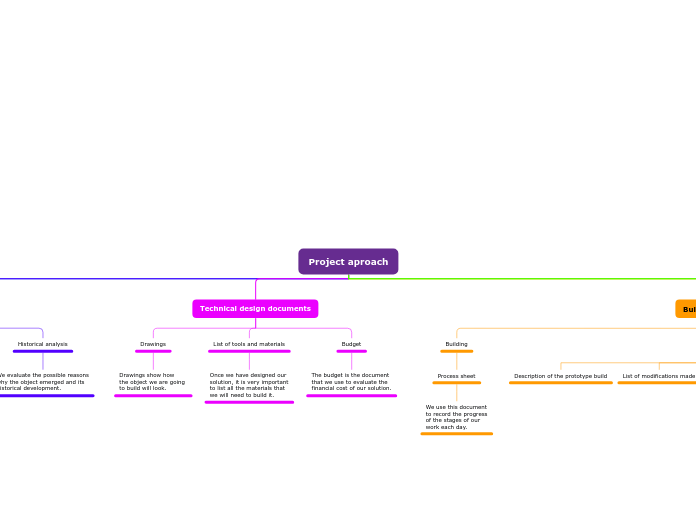Project aproach
The project aproach is a
method to find a solution in
technology problems.
It consists of four stages:
A. Analyse
1. Detect the problem or need
2. Information and research
3. Search possible solutions
4. Choose the solution
B. Design
5. Design
6. Planning
C. Build
7. Build the product
D. Evaluate
8. Check the results
9. Presentation and assesment
10. Report
Object analysis
Morphological analysis
We analyse the shape of the object,
its size, colour and basic physical
characteritics.
Functional analysis
We study how the object works,
its utility, how it is used and the
potential risks of its use.
Technical analysis
We tudy how the object was
made (its materials), also we
study the technology used to
make it and the enviromental
risks of the materials used.
Economic analysis
We analyse the financial
cost of manufacturing the
product and its slling price.
Social analysis
We study the projectfrom the
point of view of its social impact
and analyse the human needs
that it needs.
Aesthetic analysis
We evaluate how our sense
react to the object, its
appearance, whether it looks
nice or not.
Historical analysis
We evaluate the possible reasons
why the object emerged and its
historical development.
Technical design documents
Drawings
Drawings show how
the object we are going
to build will look.
List of tools and materials
Once we have designed our
solution, it is very important
to list all the materials that
we will need to build it.
Budget
The budget is the document
that we use to evaluate the
financial cost of our solution.
Building and evaluation
Building
Process sheet
We use this document
to record the progress
of the stages of our
work each day.
Evaluation
Description of the prototype build
List of modifications made
Final drawing of the solution
Total cost of the project,
with modifications, and
the number of hours
spent on it
Enviromental impact of
the solution created
Your own thoughts about
how the work went
Sales cycle
Price
Price is a crucial element in
the sale of a product. It is
related to production costs
but it is also part of the
strategy of the company.
Promotion
The most common types of
promotion are advertising
campaigns on television, in
the newspapers and on
digital media. These
compaigns target potencial
consumers and show them
the products in an attractive
way so that they will want to
buy them.
Distribution
Wholesale
The product is
supplied to
retailers and
large conumers.
Retail sale
The product is
supplied directly
to the end-user.
Online sale
The product is
distributed
through webites,
apps, etc.
Franchises
The product is
sold through a
network of
stores owned
by private
individuals who
adopt the product
a their own.
Innovation and obsolence
Innovation
Is a modification made
to a product to adopt it
to new conditions about
by changes in
requirements or progress
Obsolence
Some products have fallen
into disuse because they do
not have the functionality
of the new technologies
appearing on the market.
